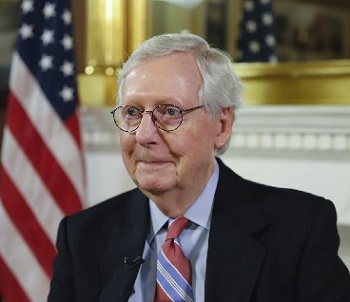"The West cannot be caught unprepared for this challenge"
WASHINGTON, D.C. – U.S. Senate Republican Leader Mitch McConnell (R-KY) delivered the following remarks Wednesday on the Senate floor regarding national security priorities:
“Over the weekend, President Biden once again refused to describe the situation at the southern border as a ‘crisis’.
“Apparently, according to the Commander-in-Chief, ten thousand illegal border crossings in a day – and the busiest month and year on record at the border – is somehow not a crisis.
“Needless to say, I’m glad that Senator Lankford and our colleagues working on meaningful border security policy don’t share that view. I’m glad that we may soon be able to address an urgent crisis with urgent action.
“Negotiators are making headway toward the most significant border enhancements in almost 30 years.
“They’re getting closer to delivering serious, lasting solutions to the unprecedented humanitarian and national security catastrophe that’s unfolded on President Biden’s watch. That’s certainly good news.
“Of course, our colleagues’ work is also the linchpin of our broader efforts to address the national security challenges we face around the world.
“From Russian aggression in Europe to Iran-backed terror in Israel and the Middle East to competition with China.
“An increasingly aggressive China represents the greatest strategic challenge of the century. And recent events in the Indo-Pacific remind us exactly what’s at stake.
“The PRC is an expansionist, revisionist, and repressive power, all at the same time. It wants to impose its will on its neighbors, regardless of their views or values – just as it does at home.
“Just consider the free, fair, and hotly contested elections that took place in Taiwan this past Saturday. The people of Taiwan resisted Beijing’s blatant efforts to interfere in their politics. And the PRC is clearly unhappy with the outcome of the election, which saw the DPP maintain its hold on the presidency.
“But it wasn’t just the results of Taiwan’s elections that the PRC views as a threat. It’s also the basic process itself. The idea of self-determination – of citizens getting a choice – terrifies leaders in Beijing.
“Of course, it’s impossible to watch Taiwan’s defiant self-expression without thinking of how fragile this autonomy can be. Just remember how swiftly the PRC has acted to snuff out forces of democracy in Hong Kong.
“Right now, my old friend Jimmy Lai – prolific publisher and a proud Hong Konger – is on trial. He’s facing the possibility of life in prison simply for committing the crime of journalism, of seeking to publish the truth at variance with the Party’s definition of it.
“See, the Chinese Communist Party doesn’t just fear its own people. It fears the pursuit of truth.
“And on both counts, Beijing finds common cause with fellow authoritarians in Moscow, Tehran, and Pyongyang.
“These regimes, and the would-be imperialists who lead them, understand that their most precious currency isn’t truth or legitimacy but control and fear.
“The PRC subjects its citizens to extensive surveillance, censorship, and repression. And in the case of ethnic minorities like the Uyghurs, Beijing has employed detention, sterilization, and outright genocide.
“Beijing fears difference. It fears dissent. And not just at home. PRC interference in Taiwan’s democracy is emblematic of the shadow of intimidation Beijing hopes to cast further across its region.
“The PRC is building a military with the capacity to bend Beijing’s neighbors to its will. It’s putting U.S. allies like the Philippines directly in its crosshairs. It’s aiming to impose direct, prohibitive costs on the United States. And it isn’t pinching pennies to achieve those aims.
“For more than two decades, its investments in new military equipment and capabilities have grown by an average of 10 percent per year.
“So, it’s become quite fashionable in Washington to talk about how we’re not taking competition with China seriously enough.
“But the resource this competition demands most urgently is not a stern lecture from a climate diplomat.
“What America and our allies need most in the race to out-compete our top strategic adversary and systemic rival is hard power.
“At its essence, winning this competition means credibly deterring Beijing’s worst impulses. Which for us means investing in American strength.
“Outcompeting the PRC will require greater investments in our military capabilities and in our industrial capacity to produce them.
“The West cannot be caught unprepared for this challenge. We cannot afford to neglect the lessons of history.
“The Senate has opportunities ahead to demonstrate that we understand what’s at stake. We will have chances to take hard power investments seriously.
“We need to be ready to take them.”
###












